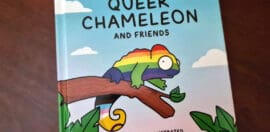Doco of the Month: Rosemary’s Way

24 June 2021 at 8:14 am
Rosemary Kariuki is on a mission to empower migrant women. She is the inspiration behind the documentary Rosemary’s Way. Here, Ros Horin and Jackie Turnure tell Wendy Williams about the film and ask if one person can achieve so much on their own, what can we all do together?
From the moment Rosemary Kariuki bursts on to the screen, it is hard not to be drawn to her.
Her infectious laughter exudes kindness and positivity. Those in her orbit refer to her as a healer, an enabler, a connector, a changemaker and “the mum of everybody”.
It’s easy to see why she was awarded the Australian of the Year Local Hero 2021 Award for her work advocating for migrant and refugee women.
Kariuki, a migrant herself, came to Australia in 1999 after fleeing Kenya to escape family abuse and tribal clashes.
Her early years in Australia were lonely. But it was this experience that helped her to recognise how much of an issue isolation is for many migrant women.
Now employed as a multicultural community liaison officer with NSW police, Kariuki’s initiatives include the African Women’s Dinner Dance, the African Village Market (which helps migrants and refugees start their own businesses) and a cultural exchange program between women refugees and migrants and Australian country women.
Throughout Rosemary’s Way, we see her empowering the women around her, enticing them out of cultural silos, exposing them to new experiences and inviting them to better participate in Australian life.

But while Kariuki is certainly a force of nature, the documentary is as much about the women around her.
Many aren’t used to going out alone, have no transport and speak little or no English. They have never gone beyond the supermarket in their homes in suburban Sydney. They are dealing with extreme isolation, fear and loneliness, and in some cases domestic violence and rape.
Over the course of a year, we see this group of vulnerable women, from countries as diverse as Bangladesh, Iraq, and the Congo, transform as Kariuki coaxes them to participate in new adventures culminating in a three-day homestay with Aussie families in rural NSW.
Director Ros Horin told Pro Bono News the film is an eye opener for many people.
“I had a friend from Melbourne ring me the other day, and say ‘I just couldn’t believe that people could be so lonely, or so isolated, or have seen so little of the country, that you can be here that long and not have seen the beach’,” she says.
“I was completely stunned when I met Sufia [a migrant from Bangladesh who is featured in the documentary] and she said ‘I’ve been 20 years in this country and this is my first time out on my own, and I have to learn how to make a friend, I’ve never done that before’. I was so moved by that statement, I just thought this is extraordinary, how is it possible.”
At its heart, the film is a celebration of community. It offers a hopeful glimpse of what is possible when we come together.
While it is a coincidence that the film has been released during a pandemic that has seen many of us closed in our homes, Horin says the film is exactly what we need at the moment.
“Isolation has been the zeitgeist now,” she says.
“All of us understand how important connection and community is so I think it is a very apt time. Especially because the film celebrates the power of community and connection and friendship and women supporting women.”

She says the power of this film – and the power of any good film – is that it activates people. This has been borne out in the way audiences have responded to Rosemary’s Way.
“Just about every time the film is presented and we have a Q&A, one of the first questions is what can I / we do to make a difference,” Horin says.
“I think it inspires people and makes everyone aware of how we do live in siloes. It’s something we take for granted, we just accept on the surface level that we’re a very successful multicultural country without thinking much about what that means.
“But when you hear those women in Fairfield [a western suburb of Sydney] say ‘I feel like I’m living in the middle east and I have to go into the city to feel like I’m in Australia’, you kind of think wow, we’ve gotta get out there and do something.”
Certainly the film highlights the disparity between our idea of a multicultural Australia and the reality for many refugees and migrants.
Horin says one of the most eye-opening moments for her was realising the extent to which migrants want to see more cultural diversity themselves.
“[I was stunned] when Pasca said she has lived in Auburn for 10 or 12 years and she has actually never had a conversation with an Aussie. She just sees other women who look like her,” Horin says.
“The fact that they feel trapped in siloes, I didn’t have that sense before. I think the government assumes that all Africans like to be in the same community… I was really amazed to hear it from their point of view, that they want more diversity and want to feel more part of this country.”
This is something the film aims to help with.
Jackie Turnure, the impact producer on Rosemary’s Way, told Pro Bono News that while they can’t clone Rosemary and send her around Australia, they can work with people like her.

As part of the impact campaign that has been built around the film, they have brought together a group of different partners – including Settlement Council of Australia, Settlement Services International, Community Migrant Resource Centre, and The African Women’s Group – to get the documentary and a specially designed community activation kit into remote and regional communities across Australia.
In particular, the film is working with Country Women’s Association to roll out a 12-month roadshow that combines screenings of Rosemary’s Way with a suite of resources to support women to connect after the film.
“The idea being that this series of film and cultural exchange events, which will include food and dancing and all the fabulous things you see in the film, will then inspire either a monthly picnic, or an annual multicultural dinner or a dance or whatever that community feels is appropriate for them,” Turnure says.
“That way we can really use the film, which is a celebration of connection, to bring people together not just around the film but beyond the film – and that will be a wonderful impact if we can make that happen.”
The goal is to build the community’s capacity to provide support for migrant women, both newly arrived and established, with the ultimate vision of an Australia where everyone feels that they belong, and are safe, supported and connected.
However, Turnure is quick to point out that it is a grassroots campaign.
“At the moment we’re starting with zero and we’re working our way up,” she says.
“This is not a fait accompli, we do not have an impact campaign budget, we’re applying for funding.”
Anyone can help, by organising a screening in their town.
Ultimately, Horin says the message of the film is that it is all of our responsibility to make newcomers welcome in this country and to assist them in connecting to Australian society.
“It’s not an arduous responsibility, if we do it it is something that brings rich rewards, we always get so much back from reaching out,” she says.
Turnure agrees.
“When everyone feels like they belong, everyone wins,” she says.
“And these are not expensive, complicated things. Sometimes a cup of tea can change a person’s life.”
Rosemary’s Way is screening in select cinemas via FanForce.
To find a screening near you or host your very own screening see the website.
For the latest information about the film and campaign follow on Facebook or Instagram.
Each month Pro Bono Australia and Documentary Australia Foundation present a Doco of the Month, profiling powerful documentaries with social impact at their heart.
Documentary Australia Foundation is Australia’s only not-for-profit organisation that fosters social change through documentary storytelling.







